Finding Purpose: Why I quit climbing ladders in favour of the snakes
- dawnwildphotography

- Aug 30, 2024
- 7 min read
Updated: Jul 16

"What do you want to be when you're older?"
Most of us will remember being asked that question when we were growing up.
For some, it's clearly defined (by themselves, or their parents) from the day they decide which subjects to study in school, in order to pursue further education in a specific field. Medicine, for example, law, finance, teaching, engineering, etc.
But for others, like me, it wasn't so clear cut. I wasn't particularly good at one specific thing; kind of average at everything. A "jack of all trades, master of none" sort of situation. I knew that I most enjoyed the creative aspects of learning; like drawing and design, as well as writing and poetry. But I wasn't one of those naturally talented kids, nor was I very confident. I knew my childhood obsession with dolphins wouldn't lead anywhere either, as science was really hard. So what could I do?
Despite having supportive parents who said I could "be whatever I wanted to be", I was filled with self-doubt and indecisiveness. Traits that followed me through life, shaping my journey. I selected my University undergraduate (Events and Marketing Management) literally based on which course would let me in with the grades I had.

I ended up doing quite well, and it certainly seemed like a 'successful' career - I was working for a global organisation, consistently exceeding my performance objectives, getting promotions etc.
But something was missing. It had been all along. That thing that drives you every day, that makes you want to do better, that makes you feel like you are contributing something worthwhile into the world.
Purpose.
A word that is often overused, yet undervalued. A word of wisdom, turned into a buzz word.
But who even are we, without a "purpose"? What is important to us? What do we stand for? What is it that's worth fighting for, worth dedicating our every existence to?
Questions I asked myself when the opportunity to take voluntary redundancy from my corporate employer emerged. Very important questions that sparked the biggest change in my career so far, and helped me to re-evaluate the type of person I want to be.
Existential crisis
Twelve years in marketing passed and suddenly I hit a point where my heart just wasn't in it anymore, and I had no idea where my life was going. A few years prior, I had started taking an active interest in the natural world, and the impacts of human activity on our environment. I think this was the spark that lit my existential crisis—being highly aware of the damage and destruction we were causing, and not doing anything about it... in fact, likely contributing to it.
I had read an article in my Grandma's RSPB magazine (full credit to her for my love for nature!) It mentioned climate change, a term I wasn't too familiar with at the time (c. seven years ago). I decided to give it a quick Google search, and down the proverbial rabbit hole I went.
It started with the IPCC 1.5 degree global warming report, which had recently been released. The first time dipping my toe in the (melting Arctic ice) water on the subject, this was a particularly hard read—one I suddenly began to regret. It seems that once you become aware, it is impossible to continue being ignorant.
Fight or flight
Research shows that anxiety, particularly when it relates to the future survival of our very own species, can be paralysing. It can leave us feeling completely hopeless, and helpless. I was drowning in devastating scientific studies and consumed by bad news about the state of our planet's health... all the while seeing governments rolling back climate commitments, issuing new licenses for oil fields, micro-plastics found in newborn babies, annual whale culls continuing in 'civilised' countries, and so on.
And worst of all, people around me were not even paying attention; caring more about the latest TikTok craze or 'fast fashion' phase, as though none of this was happening. I just couldn't understand it. Why was nobody else in my life feeling this surging panic, like I was?
Researchers are increasingly investigating if this emotional response to the climate crisis, this 'eco anxiety', that I was experiencing might actually be valuable, and how if more people felt it, they'd be more motivated to take action.
"Greta Thunberg’s activism, borne out of her depression and urge to make a difference, is an example of the positive outcomes climate anxiety can have" - Borter
It got me thinking, if I could feel this deeply passionate about something, surely it would be better to channel those emotions into something more positive? Instead of falling deeper into depression, maybe I could be part of the solution instead? And maybe that would help with the existential crisis I was also experiencing?
The turning point
I started seeking out volunteering opportunities that might help to alleviate the guilt I was feeling for all of the damage that we (collectively) have done to our planet. It started with organising litter picks with my colleagues and in my local community, and then expanded to joining the Scottish Wildlife Trust as a Trustee.

Shortly after that, I signed up to participate in a Rewilding Week with Trees for Life. I spent an entire week in a bothy (a basic shelter in remote places) deep in the most stunning glen in the Scottish Highlands with 11 strangers, no wifi, electricity, or hot water. We spent the days out in the hills planting native trees to help restore the Caledonian Forest, and evenings were spent having communal meals, creating music by the fire, or gazing up at the Milky Way. It was one of the most awe-inspiring experiences I'd had to date, leaving me feeling more connected than ever to nature—but also part of a community of like-minded people.

From corporation to conservation
I realised then that 'Big Corp' was no longer where I fit. I knew that I wasn't motivated by (perhaps had never been) performance reviews and the next promotion, I wanted to be valued more for the impact and change I was creating. I wanted to pursue a career in conservation, something that I was genuinely passionate about and would give me the opportunity to drive change.
I enrolled in a Wildlife and Conservation Management distance learning course at SRUC, which was designed especially for career changers. And I left my corporate job. I took a redundancy package, then spent the next six months travelling with my camera, and contributing to various conservation projects across the globe. Whilst it was the scariest decision I've probably ever made, I needed to take advantage of this opportunity and make a leap of faith.
In nature, I found my calling
Whist I travelled the world in search of purpose, I saw firsthand the wonders of an environment brimming with life and colour. I woke each day to the unmistakable sound of the Montezuma Oropendola, and the unsettling scream of the Howler Monkey. I revelled in the damp dewy smell of the tropical rainforest, and living simply with basic amenities.

I saw the value of indigenous communities and how they act as stewards of the land, protecting over 80% of the world's remaining biodiversity. I observed how the children were raised by the village—not by stressed-out, overworked parents. I saw how they frolicked in the rivers, instead of playing computer games.
This ended up being a pivotal moment for me, and has altered my trajectory. I'd never had such clarity before, and at this point I knew I wanted to dedicate my life to protecting and restoring nature.
Leveraging existing skills
I learnt that many of the skills I gained as a marketer (comms strategy, partnerships, social media, writing, web design..) are all incredibly valuable in the conservation world, too. In fact, Sir David Attenborough's first Instagram post highlighted the critical role of effective communications in address climate change, stating that;
"Saving our planet is now a communications challenge."

What's more, I could now utilise my passion for photography towards something useful - knowing that visual storytelling sparks deeper emotional connection, which is crucial for capturing attention and driving action.
I've already had some great opportunities, supporting inspiring organisations like MOYO Training Foundation and Alladale Wilderness Reserve to communicate their ambitious and forward-thinking aspirations for nature.
Roots that grow
Switching career to one rooted in conservation was not simply a professional decision but a calling—to contribute more meaningfully to a greater cause. The realisation that work occupies such a significant portion of our lives serves as a catalyst, propelling us towards a more fulfilling life—one where we can trade the ordinary pursuit of "success" for a greater, more rewarding purpose.
Start where you're at
It can be scary, the prospect of starting again from scratch. But it doesn't need to be that way. In fact, you don't need to switch your entire career, if you don't want or are unable to. You don't need to be a scientist, and you don't always need to sacrifice your salary.
Lawyers can fight for environmental protection and indigenous rights.
Financial advisors can prioritise investment in clean energy and natural capital.
Teachers can inspire and shape the minds of future generations.
Business leaders can embed nature in their strategies and plans.
Tourism professionals can promote travelling in harmony with nature.
It's time to think outside the box about where we can have impact and find purpose in our existing scenarios.
So, instead of asking yourself (and your children) "what do you want to be"... why not try; "who do you want to be?" and "what do you want to contribute to the world?"
Updated July 2025. Originally written in August 2024.
Commentaires